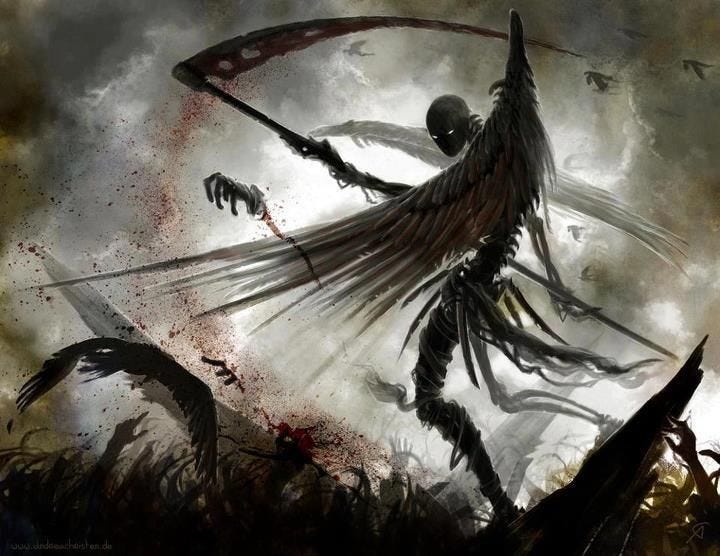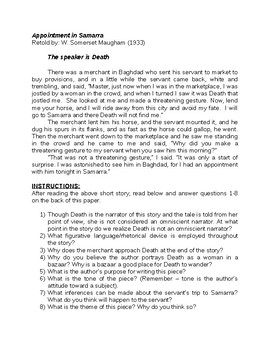

4) towards them? I believe that the author was trying to illustrate the inescapability of Death by showing us that Death walks among us, so to speak. 4).ĭoes this mean that anyone in the crowd recognized who Death was, but simply were not afraid of her unless she made what was perceived as a “threatening gesture”(pg. We also read that the merchant went to the marketplace and could see Death standing in the crowd(pg. The servant knew immediately that the woman that “jostled”(pg. I find it rather peculiar that in this tale we are led to believe that Death was very easily recognizable. Once Death is given human elements, like the ability to be surprised, it gives the illusion that one can cheat death. I believe the author intended to do this in order to make Death appear mysterious, yet also familiar to the reader. Death narrates this tale in a way that leads us to believe that she is almost an omniscient being in the way that she is able to describe the dialogue between the servant and his master, but an omniscient narrator is incapable of being surprised himself or herself and we find this not to be the case in this story. The act of confronting Death also shows that the merchant did not fear Death since he believed that Death posed no threat to him because she was here explicitly for his servant.ĭeath is the main character, as well as the narrator of this story, yet the author provides us with no real description of her other than calling her a woman.

This gesture shows that not only did the merchant care for the life of his servant, but it also shows that he had a certain curiosity about Death and her intentions. Maugham writes of the merchant going to the marketplace to confront Death about the encounter with his servant.


The threat of death seemed evident not only to the servant, but also to his master, the merchant. 4) towards him, but he could not fathom the idea that he had to die. To the servant it was evident that Death was there for him because he believed she had “made a threatening gesture”(pg. 4) to a place called Samarra, for it is there that the servant believes that “Death will not find me”(pg. In an attempt to take destiny into his own hands, the servant borrows a horse from his master in order to get away “as fast as the horse could gallop”(pg. Maugham illustrates the fear of dying that is such a natural part of our human nature by stating that the servant was “white and trembling”(pg. In the first sentence we read that the servant was terrified as a result of being “jostled”(pg. In this tale Death is personified as a woman who is very matter-of-fact about her work, which, more specifically, involves keeping an appointment with a certain servant. Somerset Maugham delivers a message about the harsh reality of death. I was astonished to see him in Bagdad, for I had an appointment with him tonight in Samarra. Then the merchant went down to the marketplace and he saw me standing in the crowd and he came to me and said, Why did you make a threatening gesture to my servant when you saw him this morning? That was not a threatening gesture, I said, it was only a start of surprise. The merchant lent him his horse, and the servant mounted it, and he dug his spurs in its flanks and as fast as the horse could gallop he went. I will go to Samarra and there death will not find me. She looked at me and made a threatening gesture now, lend me your horse, and I will ride away from this city and avoid my fate. In his intellectual and literary chronicle, readers will find much humor, much memory, and much food for thought.Death Death speaks: There was a merchant in Baghdad who sent his servant to market to buy provisions and in a little while the servant came back, white and trembling, and said, Master, just now when I was in the market-place I was jostled by a woman in the crowd and when I turned I saw it was Death that jostled me. Reading and re-reading the works of memorable writers of our time, interviewing them, and writing about them, he has woven literature into his life in a way that provides illumination and just plain interest for those who read the story here. The journey of the mind and heart Costa traces has some illustrious guides. Wells, Malcolm Lowry, Conrad Aiken, Edmund Wilson, Kingsley Amis, Dorothy Parker, Edith Wharton, and others. In this charming and insightful reminiscence, he introduces readers to a host of literary lives that have touched him: Somerset Maugham, H. "Now, just ask yourself", Maugham said without the least suggestion of a stutter, "wouldn't it be a dreadful world if pleasure ruled?" But pleasure has ruled Richard Costa's world - the pleasure of books and their writers.


 0 kommentar(er)
0 kommentar(er)
